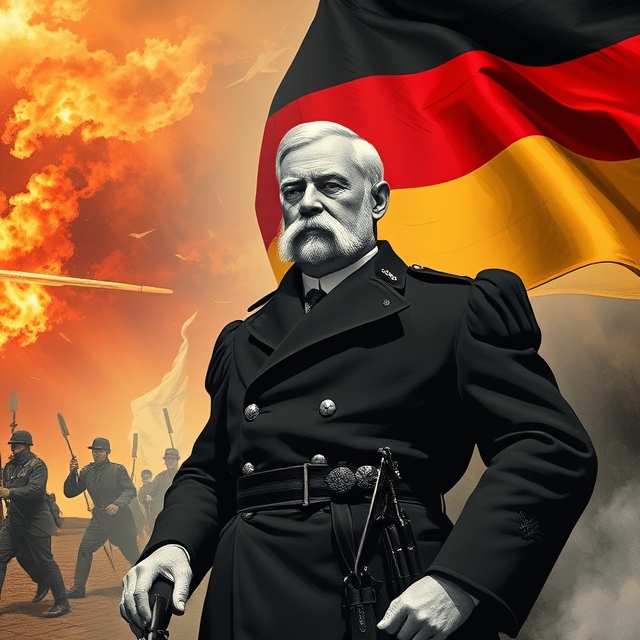The unification of Germany in 1871 was one of the most significant events in 19th-century European history. It marked the rise of a powerful new nation-state in the heart of Europe and fundamentally altered the balance of power in the continent. Central to this achievement was the figure of Otto von Bismarck, the Prime Minister of the Kingdom of Prussia, whose skillful diplomacy, strategic warfare, and political acumen played an indispensable role in the unification process.
Bismarck’s approach to unification was deeply pragmatic, relying on a combination of Realpolitik (politics of realism) and a series of calculated wars, rather than the idealistic aspirations of German nationalists. His ability to manipulate both domestic and international situations allowed him to bring together the disparate German-speaking states into a unified German Empire under Prussian leadership.
This article will evaluate the role of Bismarck in the unification of Germany, exploring his political strategies, key actions, and the broader context in which these events took place.
1. Background: The State of Germany Before Unification
Before Bismarck’s rise to power, Germany was a fragmented region consisting of multiple independent states. These states, collectively known as the German Confederation, included powerful entities like Prussia and Austria, as well as smaller entities like Bavaria, Saxony, and various other principalities. Despite shared language and cultural ties, the German states lacked political unity. The Congress of Vienna (1815) had established the German Confederation as a loose association of these states, but it failed to provide the central authority needed for unity.
The quest for unification had been a long-standing goal for many nationalists, especially after the Napoleonic Wars (1803-1815) and the subsequent rise of liberal and nationalistic movements. Various attempts at unification had been made, notably by figures like Johann Gottfried Herder and the Young Germany movement, but they were thwarted by internal divisions and external opposition.
The key issue preventing unity was the rivalry between Prussia and Austria. While Prussia had emerged as the dominant military power in central Europe, Austria’s influence in German affairs was considerable. This rivalry would play a crucial role in Bismarck’s strategy, as he understood that unification could only be achieved by excluding Austria from the German Confederation and positioning Prussia as the leader of a united German state.
2. Bismarck’s Realpolitik and Political Strategy
Bismarck’s political philosophy, known as Realpolitik, was characterized by pragmatism, opportunism, and a willingness to use any means necessary to achieve political objectives. For Bismarck, the goal of German unification was paramount, and he was willing to use diplomacy, military force, and manipulation of national sentiments to achieve it.
His political acumen can be observed in his ability to isolate his opponents and secure the support of key allies without directly confronting them. Bismarck’s approach to unification was fundamentally different from the idealistic, liberal aspirations of many German nationalists, who envisioned a united Germany based on democratic principles. Instead, Bismarck’s vision was rooted in the concept of a Prussian-led monarchy with a strong military and aristocratic foundation, excluding Austrian influence and minimizing liberal democratic ideals.
Bismarck’s first step in his strategy was to strengthen Prussia’s power, both domestically and internationally. His domestic policies, which included modernizing the economy, strengthening the military, and consolidating power within the monarchy, laid the groundwork for Prussia’s rise as the leading German state.
3. The Danish War (1864): The Beginning of Bismarck’s Strategic Maneuvering
The first major step in Bismarck’s plan to unify Germany came in 1864, with the Danish War. Denmark had attempted to annex the duchies of Schleswig and Holstein, territories with mixed German and Danish populations. Bismarck saw this as an opportunity to challenge Denmark while simultaneously strengthening Prussia’s position in northern Germany.
Bismarck cleverly aligned Prussia with Austria in an alliance against Denmark. While Austria and Prussia jointly defeated Denmark, Bismarck was already thinking of how to use the war to further Prussia’s ambitions. In the aftermath of the war, Prussia gained control of Schleswig, while Austria took control of Holstein. This division would soon lead to conflict between the two powers, setting the stage for the exclusion of Austria from the German Confederation.
4. The Austro-Prussian War (1866): Excluding Austria
The next key event in the unification process was the Austro-Prussian War of 1866. Bismarck recognized that in order to achieve the unification of Germany under Prussian leadership, Austria must be excluded from the German Confederation and the emerging German Empire.
Bismarck manipulated tensions between Austria and Prussia over the control of Holstein, provoking a war. He skillfully isolated Austria diplomatically, ensuring that other European powers, notably France and Russia, would remain neutral. Bismarck’s mastery of diplomacy was evident in his ability to prevent any external intervention in the conflict.
The war itself was short and decisive. Prussia, with its modernized military and efficient General Staff, quickly defeated Austria. The Treaty of Prague (1866) ended the war, and Austria was excluded from German affairs. In the aftermath, Prussia created the North German Confederation, which included most of the northern German states, but excluded Austria and its southern German allies.
The victory in the Austro-Prussian War cemented Prussia’s position as the leading power in Germany. The North German Confederation, a military and economic alliance of northern German states, was dominated by Prussia and provided the framework for future unification. Importantly, the war had also demonstrated the power of Prussia’s military modernization, which would play a crucial role in the unification of Germany.
5. The Franco-Prussian War (1870-1871): The Final Step to Unification
The final, decisive step in Bismarck’s strategy came in the form of the Franco-Prussian War (1870-1871). Bismarck recognized that in order to unify the southern German states, he needed to create a common enemy for all Germans to rally against. He skillfully manipulated diplomatic tensions between Prussia and France to provoke a war.
The immediate cause of the war was the candidacy of a Hohenzollern prince to the Spanish throne. France, under Emperor Napoleon III, viewed this as a threat to its influence in Europe and demanded the withdrawal of the prince’s candidacy. Bismarck, however, manipulated the situation by editing and releasing the Ems Dispatch, a telegram that made it appear as though the Prussian king had insulted the French ambassador. This provocation united the German states in support of Prussia and led to the declaration of war by France.
The Franco-Prussian War was a defining moment for German unity. The German states, including Bavaria, Saxony, and others in the south, rallied to Prussia’s side, viewing the war as a common cause against a traditional enemy. The war was a resounding success for Prussia, and by the time the war ended in 1871, France had been defeated and humiliated.
The Treaty of Frankfurt (1871) confirmed the defeat of France, and, most importantly, it led to the proclamation of the German Empire in the Hall of Mirrors at Versailles. The new empire, led by the Prussian king, Wilhelm I, was a culmination of Bismarck’s efforts to unite the German-speaking states under Prussian leadership. The unification of Germany was thus achieved, with Bismarck as the architect of this new, powerful empire.
6. Bismarck’s Legacy and Impact on German Unification
Bismarck’s role in the unification of Germany cannot be overstated. He combined a mix of diplomatic skill, military prowess, and political opportunism to transform the political landscape of Europe. Bismarck’s strategy of manipulating international rivalries, provoking wars, and isolating his enemies was a masterstroke that brought about the unification of Germany in a manner that was both efficient and pragmatic.
However, Bismarck’s vision of a unified Germany was not without its contradictions. The new German Empire was a militaristic, conservative monarchy, which contrasted sharply with the more liberal ideals of many German nationalists. Bismarck, while achieving unification, also imposed a system that was deeply authoritarian, with limited democratic participation and political freedoms. The dominance of Prussia in the new empire created tensions with other German states, particularly Bavaria.
Nevertheless, Bismarck’s actions fundamentally reshaped the map of Europe. The creation of the German Empire made Germany one of the most powerful nations in Europe, altering the balance of power and setting the stage for future conflicts, particularly World War I.
7. Conclusion
Otto von Bismarck’s role in the unification of Germany was central and transformative. Through a combination of strategic wars, diplomatic maneuvering, and a keen understanding of European power politics, Bismarck was able to achieve what had eluded German nationalists for centuries: the creation of a united German state. His mastery of Realpolitik and his ability to exploit international tensions enabled Prussia to outmaneuver its rivals and secure its leadership in the newly unified Germany. While his methods may have been ruthless and authoritarian, the unification of Germany was a pivotal moment in European history, and Bismarck remains one of the most influential figures of the 19th century.




